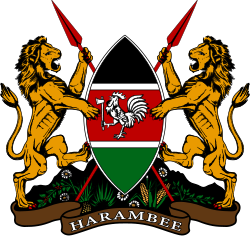 |
|---|
|
|
Economic schemes |
General elections were held in Kenya Colony on 12 February 1927. [1]
 |
|---|
General elections were held in Kenya Colony on 12 February 1927. [1]
Reports before the election noted that of the eleven white seats, five were uncontested with the incumbent returned unopposed, one was likely to be uncontested and the remaining five would be contested. [2] The Reform Party led by Hugh Cholmondeley issued an 18-point manifesto, which was approved by all the incumbent members of the Legislative Council except Hamilton Ward, who partly adhered to its programme, but reserved the right to vote independently. [3] The manifesto included a call for an elected European majority on the Legislative Council. [3] Reports that the mayor of Nairobi James Riddell would run against the Reform Party proved to be unfounded. [3]
Following their boycott of the 1924 elections, the Indian population again failed to participate fully in the election, with only one candidate standing in the five-member Indian constituency. As a result, four Indian representatives were appointed to the council after it was opened on 8 March. [4] By-elections for the four Indian seats were scheduled for the following year, but no candidates were nominated due to the ongoing boycott over the separate voting rolls for Whites and Indians. [5]
| European seats | |||||
|---|---|---|---|---|---|
| Constituency | Candidate | Party | Votes | % | Notes |
| Coast | Robert Robertson-Eustace | Reform Party | Unopposed | Re-elected | |
| Kenya | Edward Vaughan Kenealy | Reform Party | Re-elected | ||
| Henry Beynon | |||||
| Kikuyu | Corney Durham | Independent | Elected | ||
| Monthermer Montagu | |||||
| Walter MacLellan Wilson | Reform Party | Defeated | |||
| Lake | Conway Harvey | Reform Party | Unopposed | Re-elected | |
| Mombasa | GG Atkinson | Reform Party | Unopposed | Re-elected | |
| Nairobi North | Hamilton Ward | Independent | Re-elected | ||
| Charles Udall | Independent | ||||
| Nairobi South | Helmuth Schwartze | Reform Party | Re-elected | ||
| Olga Watkins | Independent | ||||
| Plateau North | James Kirkwood | Independent | Elected | ||
| John Coney | Reform Party | Defeated | |||
| Plateau South | Thomas O'Shea | Reform Party | Unopposed | Re-elected | |
| Rift Valley | Hugh Cholmondeley | Reform Party | Unopposed | Re-elected | |
| Ukamba | Francis Scott | Reform Party | Re-elected | ||
| Indian seats | |||||
| Ahmad Hussein Malik | Elected | ||||
| Arab seat | |||||
| Hamed Mohamed bin Issa | Re-elected | ||||
| Source: Colonial Reports, East Africa, Kenya Gazette | |||||
| Position | Member |
|---|---|
| Ex officio members | |
| Attorney General | Walter Huggard |
| Chief Native Commissioner | Gerald Verner Maxwell |
| Colonial Secretary | Geoffrey Alexander Stafford Northcote |
| Commissioner of Customs | Edgar George Bale |
| Commissioner of Lands | Arthur George Baker |
| Director of Agriculture | Alexander Holm |
| Director of Education | Evan Ebenezer Biss |
| Director of Public Works | Howard Lecky Sikes |
| Kenya and Uganda Railway General Manager | Godfrey Dean Rhodes |
| Principal Medical Officer | John Langton Gilks |
| Treasurer | Reginald Clifton Grannum |
| Appointed officials | |
| Chief Veterinary Officer | Andrew Gahan Doherty |
| Lilawi for the Coast | Ali bin Salim |
| Officer Commanding Troops | C S Davies |
| Postmaster General | Thomas Fitzgerald |
| Senior Commissioner, Coast | Harold Robert Montgomery |
| Senior Commissioner, Kikuyu | Ruper William Hemsted |
| Senior Commissioner, Nyanza | Cecil Moore Dobbs |
| Senior Commissioner, Ukamba | Walter Francis Glencairn Campbell |
| Solicitor-General | Frederic Gordon Smith |
| Appointed unofficial members | |
| Member to represent African interests | John Britton |
| Source: Hansard [6] | |